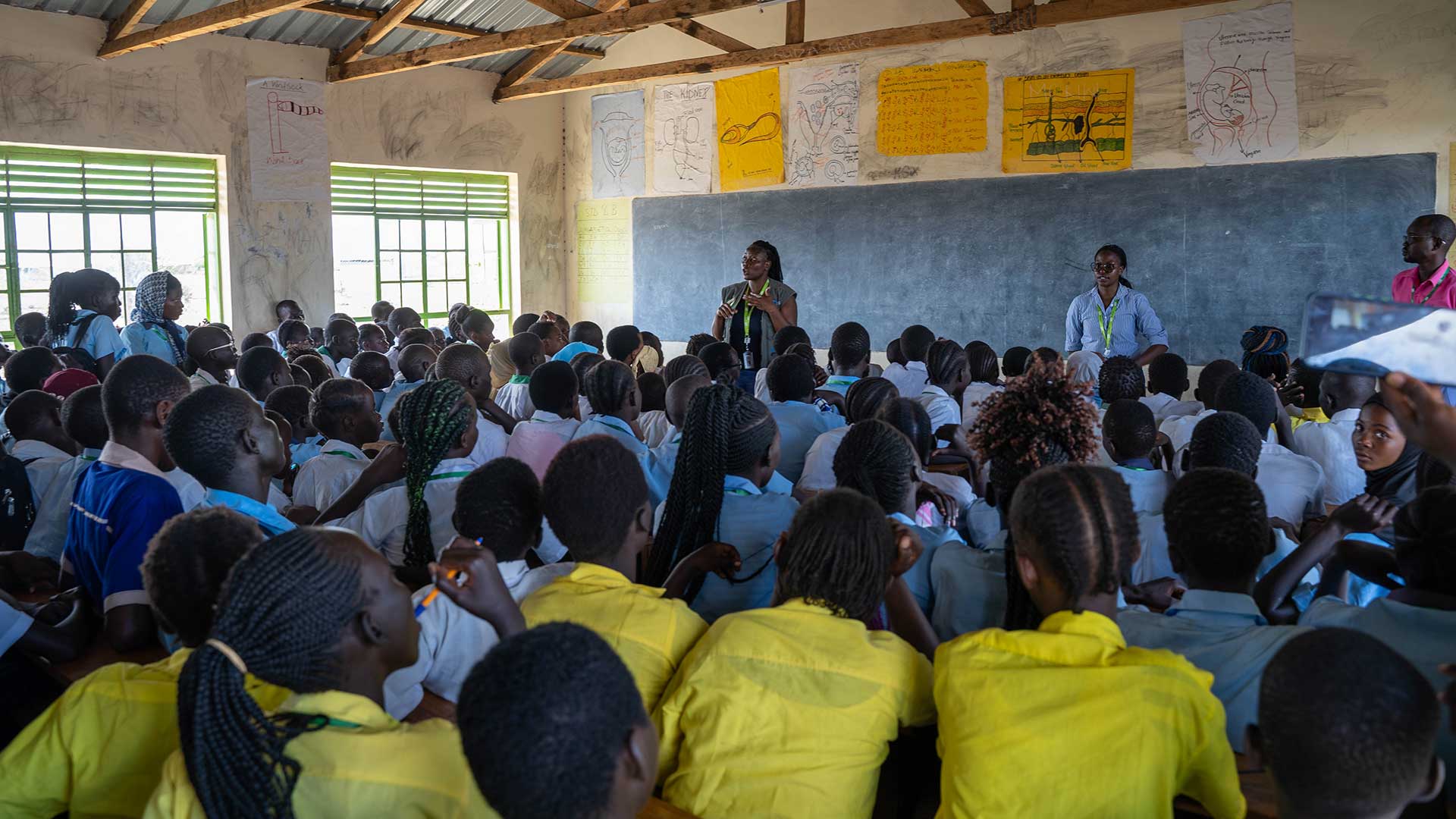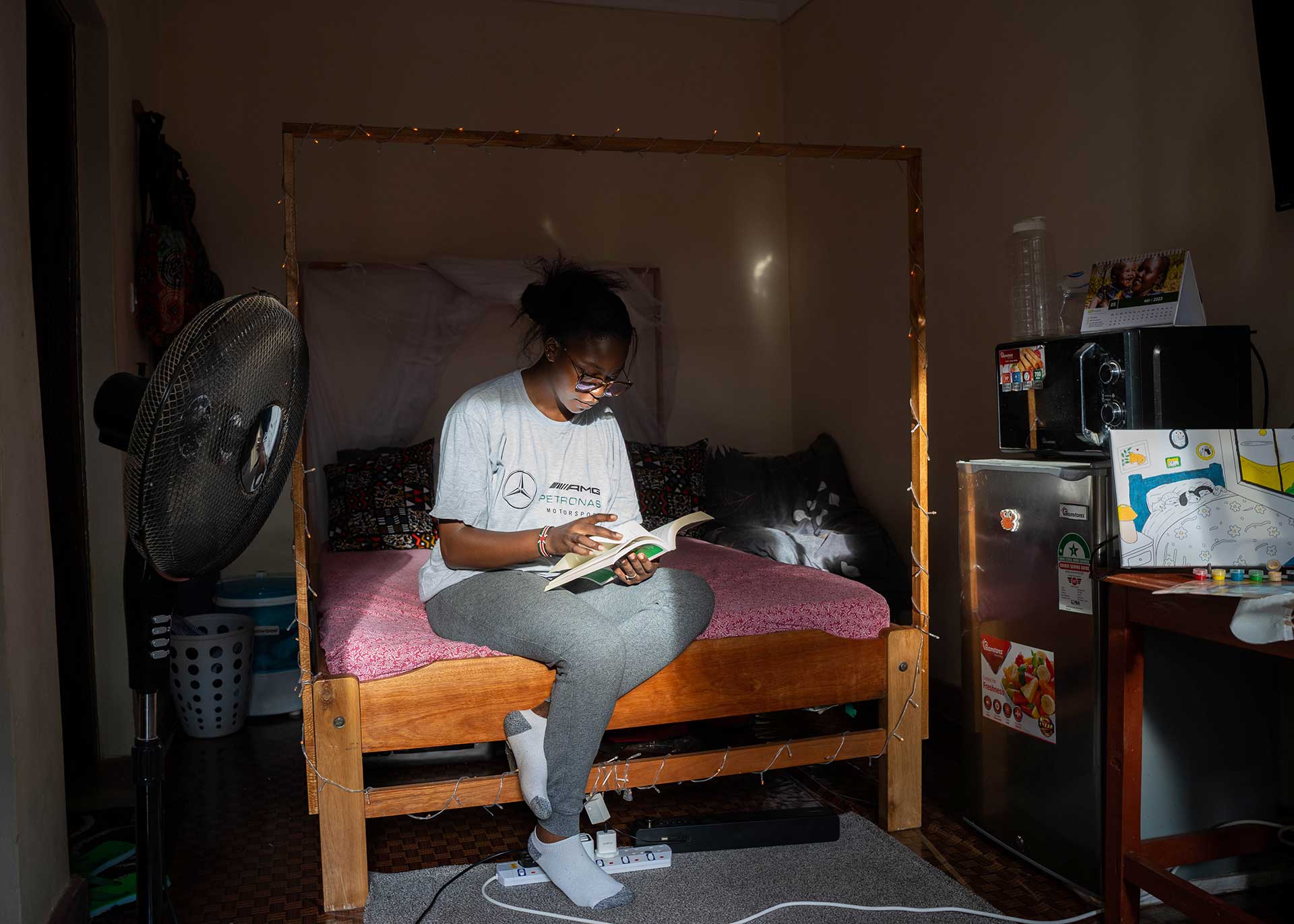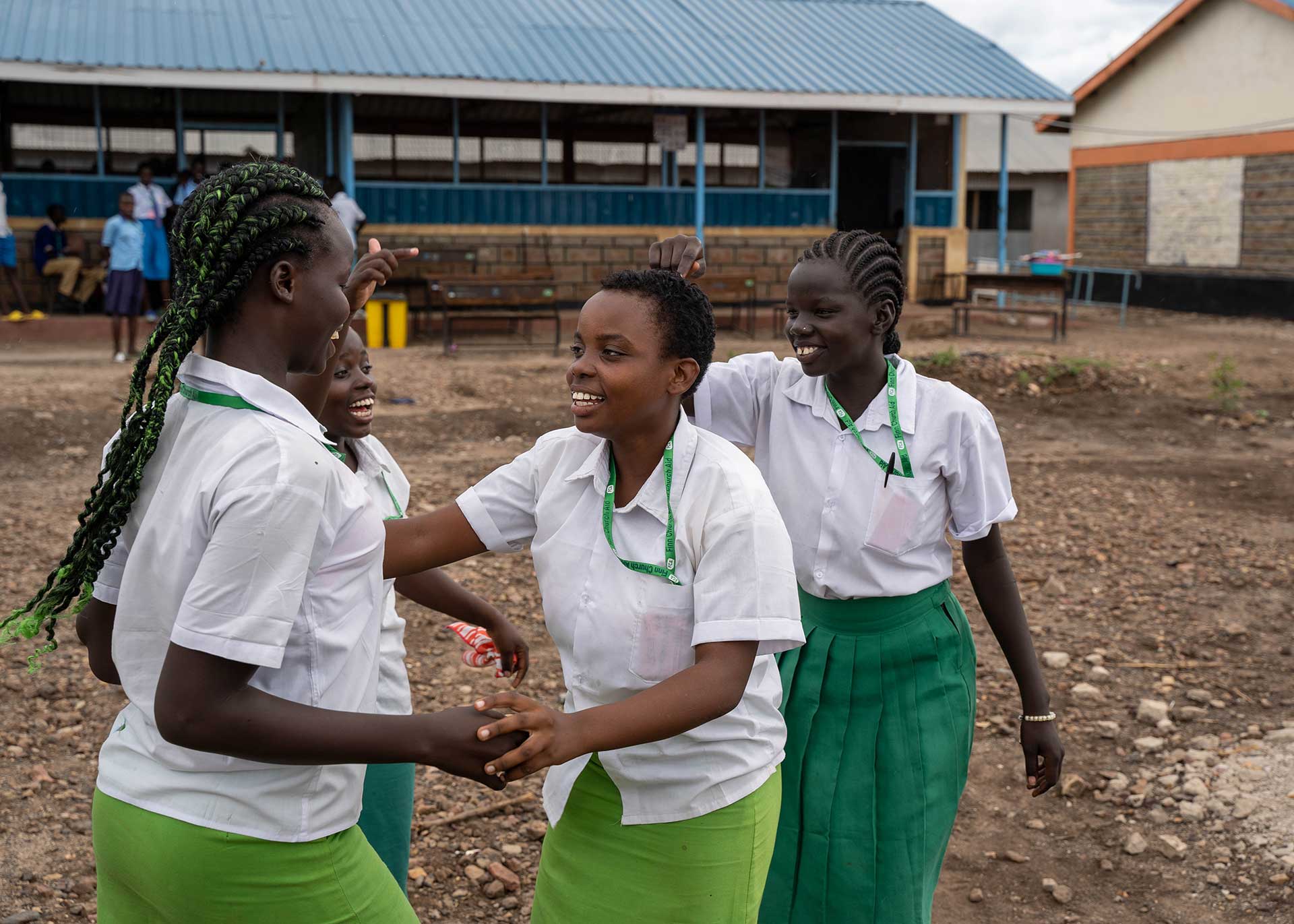Who can help the helpers?
At the Kakuma-Kalobeyei refugee camp in northern Kenya, mental health services are in short supply. The residents of the camp have fled murder and rape only to find that the daily life of the camp poses its own challenges. Working as a psychologist among people whose acute need of help is overwhelming takes its toll. What are some good ways to maintain resilience in the face of such challenges?
“REMEMBER: it’s important to have a life goal,” the teacher says, speaking to approximately forty students. The students listen intently, even though the classroom is over 30 degrees hot.
“What would be an example of a good life goal?”
“A nice house,” says one student.
“Eating sweets,” says another. “A good wife,” third one exclaims, and everyone bursts out laughing.
IN KENYA, SCHOOLS were closed for two weeks in May. Nevertheless, at the Kalobeyei refugee camp, kids were learning skills like self-esteem, setting goals for oneself, and conflict resolution at a life-skills camp.
The refugee camp is one of the largest in the world, housing around 300 000 refugees, mostly children and youth. Many live alone or with their siblings, as their parents have disappeared or died.
200 youth who have regularly attended school during the last term have been invited to participate. The invitation not only serves as a reward – the camp offers the kids meals, like in school – but also helps pass the message onwards. The youth attending the camp are likely to teach their skills to their friends in future.
“During the holidays, youth often get into trouble. Some join gangs, others get pregnant. That’s why we decided to organise a camp for teaching life skills,” says Maureen Achieng, 25.
Maureen Achieng is a psychologist at the Finn Church Aid field office in Kakuma-Kalobeyei, Kenya. Her role is supporting the psychosocial well-being of children and youth and offering counselling for difficult situations.
EVERY WEEK, there are new people arriving to the camp from neighbouring countries. Currently, the biggest source of refugees is violence in Burundi. Some are fleeing for the second time. At the same time, the camp is waiting to see the effects of the conflict in Sudan for Kenya.
“Children here have all sorts of problems: serious trauma in their home country or from being on the run, abuse at home, teenage pregnancies. On top of that come the normal young people problems, such as school or heartbreaks,” Achieng says.
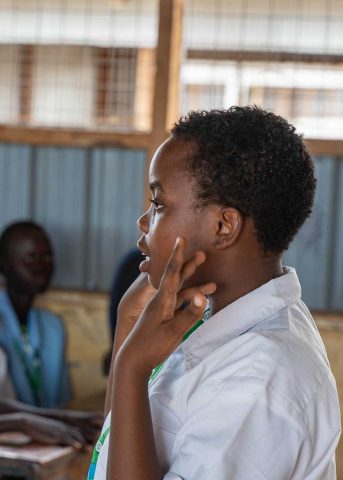
Dealing with these problems happens step by step. Achieng recommends young people set themselves goals and celebrate small achievements. Stressing the benefits of education is particularly important to girls, who are usually pressured into an early marriage. Nelly Havyarimana, 15, from Burundi, knows this very well personally.
“My mother and sisters and I came to Kenya in 2017. We had to leave home when my father died. As I had no brothers, our relatives wanted to marry us girls off. My mother thought that we should complete our studies, however, so we fled here.”
Havyarimana has learned about the importance of goals at the life skills camp.
“When I grow up, I want to be a surgeon. This can only happen through hard work – making decisions for the future and setting goals along the way. But I’m hopeful.”
Another useful skill that Havyarimana has learned in the camp: conflict resolution. The camp hosts people from many different nationalities, often without a common language. Conflicts are often inevitable.
“I’ve learned that I need to seek support from other communities. If, for example, Burundians and Sudanese are squabbling, I should at least get one person from the Sudanese side to support me, maybe some others, too. The parties to the conflict generally calm down when they realise that everyone wants them to stop.”
PSYCHOLOGIST Maureen Achieng also has other responsibilities at the camp, as she offers psychosocial support to students. In practice, this means problem-solving, therapy, academic counselling and much more. All of this is mentally taxing, even for a professional.
“I have often put myself in the shoes of a child who has had their parents murdered or a loved one raped in front of their eyes. They have had to walk to safety for days on end – without sleep, food or water.”
Achieng is also involved in an inter-organisational suicide prevention group. Both drug use and suicide attempts have recently increased alarmingly at the camp.
“The main reason is definitely the oppressive living conditions. Up to 70% of suicidal people give the living conditions as the reason of their suicidal tendencies. The same goes for drug use. It’s a way of escaping reality and hopelessness.”
The team searches for people at risk and harnesses the whole community to recognise the surrounding warning signs.
“For example, we made an agreement with the camp’s traders: if someone wants to buy a rope, a few follow-up questions are needed. What is the purpose of their purchase? All right, they want to tie up an animal. What kind of an animal? And so on. Many people give up their intentions after this sort of a thing, at least for a time.”
It is still difficult, coming to grips with things like suicide each and every day. Achieng considers it important to be able to get away from work in her free time. It’s never easy, though. There are many needing help and never enough time to help them all. On top of that, the staff live in relatively modest conditions and with little personal space.
“Even if one tries to take time off, conversations with colleagues always circle back to work. And it’s hard to avoid your colleagues if they live next door!”
IT THUS BECOMES necessary to working through the issues causing distress in others. Achieng is lucky, as she has an older colleague outside the camp for discussing ideas and getting good advice on how to solve difficult cases.
For Achieng, who is originally from Nairobi, moving to the small-scale environment of the refugee camp was also a challenge. A key part of addressing this was making their home more homelike.
“Personally, my most important household item is the video gaming console, which I take with me everywhere I go,” laughs Achieng. She admits to being a big racing game fan, but also plays other games. In addition to the console, Achieng has brought home her favourite treats, and has also taken up painting.
“Sometimes we organise art workshops for the children. Art therapy works – I have first-hand experience!” she says, smiling.
Achieng is working on a rotating schedule. In addition to the normal holidays, she has a week off after seven working weeks.
“Write this one in your story in capital letters: THE ROTATING LEAVE IS A MUST!”, Achieng urges.
“It is easy to notice that five weeks is all it takes for my colleagues to exhausted, as they start becoming very irritable easily. Especially those who have families miss their loved ones, because you can’t bring husbands, wives, or children here. A week off helps a lot.”
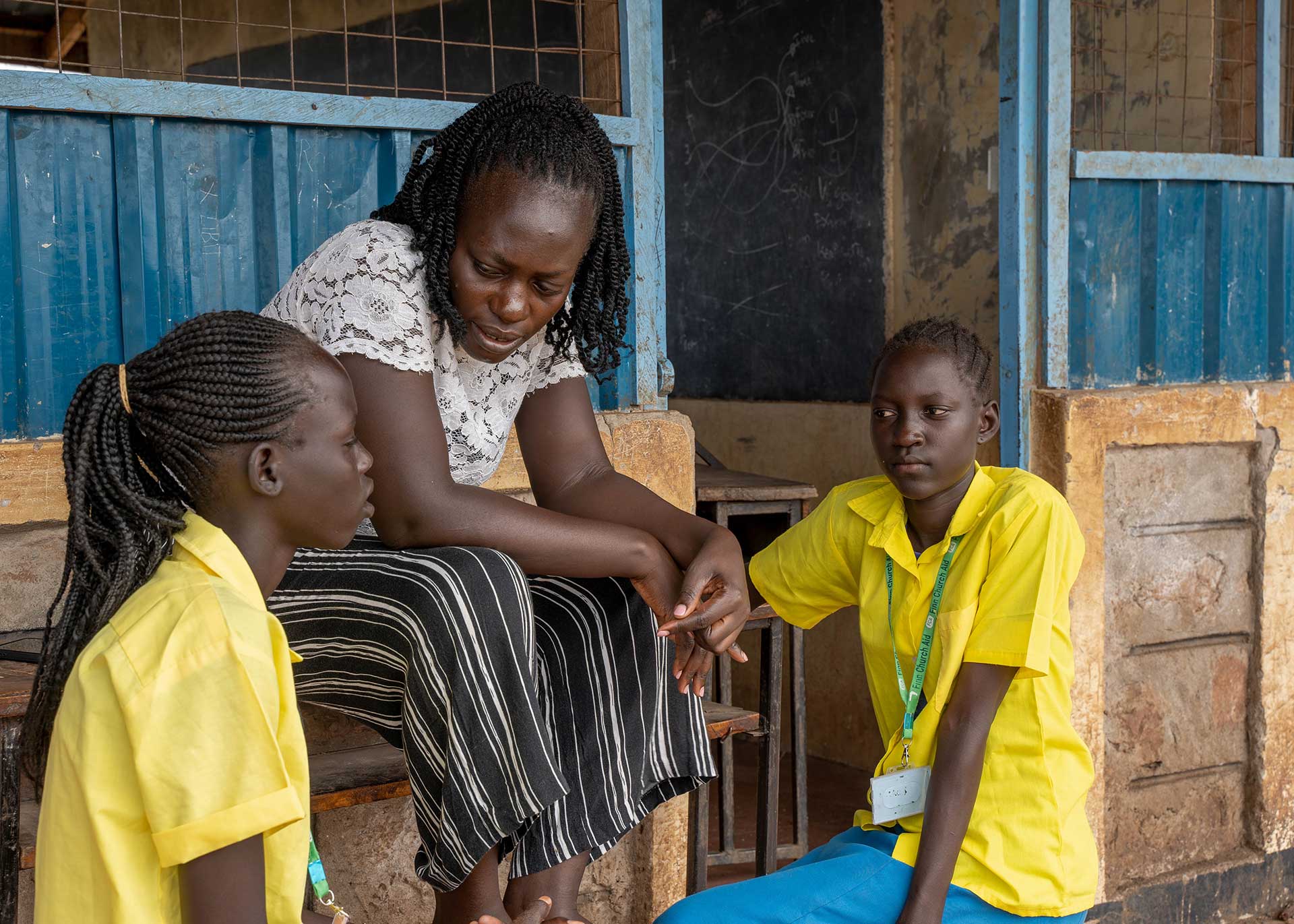
PSYCHOLOGISTS ARE NOT the only ones who have to think about how to deal with the stories students tell. Teachers hear them regularly too, and it’s possible for traumas to trigger for teachers, especially those with a refugee background. This is why peer support circles are organised for teachers to talk through their experiences.
This monthly ritual is particularly important for teachers. In an empty classroom, about ten people sit in a circle. Taking turns, they tell each other what’s on the top of their minds.
“This is an opportunity for us to talk openly about our problems and discuss how best to manage our classes,” says Edward Festo, who teaches English and Social Studies.
And a necessary opportunity it is. Class sizes can easily be around 200 pupils, making the teacher’s job difficult.
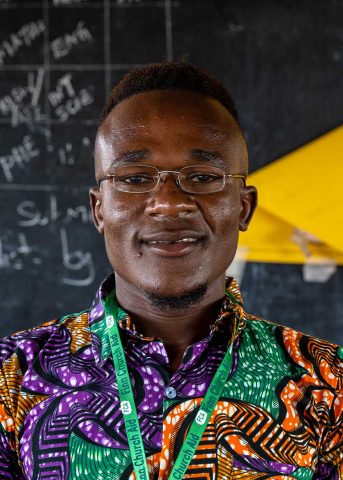
“Every day, I come home with a hoarse voice. Usually, I’m also mentally dead tired.”
Festo, from South Sudan, decided to flee the civil war in 2016 at the age of 19, after some of his siblings were killed.
“I lived in the north of the country, so making my escape through a country fighting a civil war was difficult. Many lives were lost on the way,” Festo says.
Many schoolchildren have similar backgrounds, so their stories can bring old feelings to the surface.
“We have received a lot of support in dealing with our traumas. It is our responsibility to be the professionals and adults, always and in every situation. Therapy and comprehensive training make it easier to keep it cool when things become heated,” says Festo.
He also understands the younger generation’s situation.
“Everything is more difficult nowadays. When we arrived, we were given schoolbooks, school uniforms and free education. Now the kids have to pay for books and uniforms themselves.”
Therapy has helped Festo to work through other issues.
“Living during a civil war is terrible. One must do bad things and link up with bad groups to survive. Therapy has been a life changer for me.”
TEACHERS are not the only ones getting help from therapy. Sixth grader Rashidi Shabani, 16, says he used to be very short-tempered.
“I got angry very easily. When I was out with my friends, I would get upset and start intense arguments with them. Therapy has helped me process these feelings. We’ve gone through what makes me get upset and evaluated my feelings generally. “
“Nowadays, if I find myself in a difficult situation, I take a deep breath or talk to others about my feelings. My anger dissipates and I feel free of stress.”
Shabani fled the war in the Democratic Republic of Congo with his mother and siblings in 2016. In the future, he wants to also be able to help his friends manage their emotions. He hopes to turn helping others into a career.
“When I grow up, I would like to be a psychologist. I’ve had a lot of help from psychologists, they do so much good. I would like to be like them as an adult.”
Text and photos by Björn Udd
